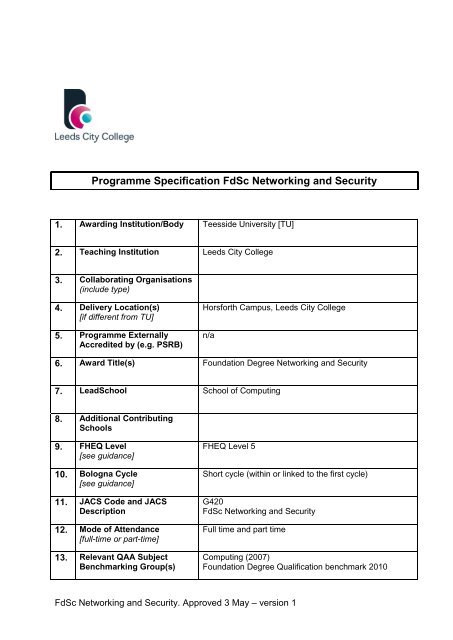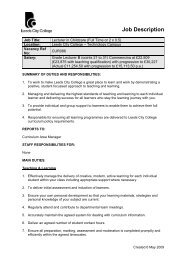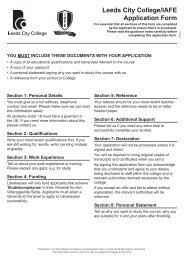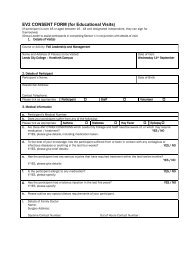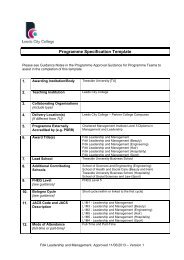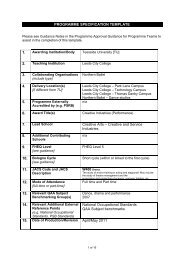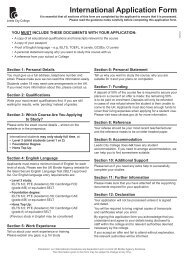Programme Specification FdSc Networking and Security May 2013
Programme Specification FdSc Networking and Security May 2013
Programme Specification FdSc Networking and Security May 2013
Create successful ePaper yourself
Turn your PDF publications into a flip-book with our unique Google optimized e-Paper software.
<strong>Programme</strong> <strong>Specification</strong> <strong>FdSc</strong> <strong>Networking</strong> <strong>and</strong> <strong>Security</strong><br />
1. Awarding Institution/Body Teesside University [TU]<br />
2. Teaching Institution Leeds City College<br />
3. Collaborating Organisations<br />
(include type)<br />
4. Delivery Location(s)<br />
[if different from TU]<br />
5. <strong>Programme</strong> Externally<br />
Accredited by (e.g. PSRB)<br />
Horsforth Campus, Leeds City College<br />
n/a<br />
6. Award Title(s) Foundation Degree <strong>Networking</strong> <strong>and</strong> <strong>Security</strong><br />
7. LeadSchool School of Computing<br />
8. Additional Contributing<br />
Schools<br />
9. FHEQ Level<br />
[see guidance]<br />
10. Bologna Cycle<br />
[see guidance]<br />
11. JACS Code <strong>and</strong> JACS<br />
Description<br />
12. Mode of Attendance<br />
[full-time or part-time]<br />
13. Relevant QAA Subject<br />
Benchmarking Group(s)<br />
FHEQ Level 5<br />
Short cycle (within or linked to the first cycle)<br />
G420<br />
<strong>FdSc</strong> <strong>Networking</strong> <strong>and</strong> <strong>Security</strong><br />
Full time <strong>and</strong> part time<br />
Computing (2007)<br />
Foundation Degree Qualification benchmark 2010<br />
<strong>FdSc</strong> <strong>Networking</strong> <strong>and</strong> <strong>Security</strong>. Approved 3 <strong>May</strong> – version 1
14. Relevant Additional External<br />
Reference Points<br />
(e.g. National Occupational<br />
St<strong>and</strong>ards, PSRB St<strong>and</strong>ards)<br />
E-Skills NOS for IT <strong>and</strong> Telecoms Professionals<br />
15. Date of Production/Revision Jan <strong>2013</strong><br />
16. Criteria for Admission to the<br />
<strong>Programme</strong><br />
(if different from st<strong>and</strong>ard<br />
University criteria)<br />
This course has minimum entry requirements of 1 x E in<br />
a relevant A level or a pass in BTEC National<br />
Diploma/Extended Diploma or another relevant<br />
vocational level 3 qualification, together with a GCSE at<br />
grade C in English <strong>and</strong> Maths. However, c<strong>and</strong>idates<br />
receiving this minimum offer would need to demonstrate<br />
experience in <strong>and</strong> commitment to their chosen<br />
Foundation Degree subject <strong>and</strong> a suitable reference<br />
from a tutor.<br />
A typical offer is likely to be 2 x D at A level, or a Merit<br />
profile in a relevant BTEC National Diploma/Extended<br />
Diploma, together with a GCSE at grade C in English<br />
<strong>and</strong> Maths, together with experience <strong>and</strong> a suitable<br />
reference from a tutor.<br />
Applications will be accepted from those who have few<br />
or non-st<strong>and</strong>ard qualifications but a wealth of work <strong>and</strong><br />
life experience, including appropriate experience in a<br />
relevant field, commitment <strong>and</strong> ability. Applicants in this<br />
group will be invited to interview or provide a portfolio of<br />
evidence to support their application.<br />
17. Educational Aims of the <strong>Programme</strong><br />
The programme aims to:<br />
• Provide a challenging high quality programme, vocationally focused on the knowledge<br />
<strong>and</strong> skills required for work in the industry of <strong>Networking</strong> <strong>and</strong> <strong>Security</strong>;<br />
• Enable students to develop their academic, practical <strong>and</strong> transferable skills as a<br />
preparation for their subsequent careers in <strong>Networking</strong> <strong>and</strong> <strong>Security</strong>;<br />
• Provide opportunities for students to work independently <strong>and</strong> in collaboration with<br />
others, providing the opportunity to develop self-discipline, determination <strong>and</strong><br />
responsibility;<br />
• Contribute to the skill base of local, regional, national <strong>and</strong> international economies in<br />
the context of the development of <strong>Networking</strong> <strong>and</strong> <strong>Security</strong> sector<br />
• Produce capable <strong>and</strong> well-rounded graduates who will make a contribution to the<br />
Network <strong>and</strong> <strong>Security</strong> labour force;<br />
• Enable learners to progress onto an Honours degree.<br />
18. Learning Outcomes<br />
The programme will enable students to develop the knowledge <strong>and</strong> skills listed below. On<br />
successful completion of the programme, the student will be able to:<br />
Knowledge <strong>and</strong> Underst<strong>and</strong>ing(insert additional rows as necessary)<br />
<strong>FdSc</strong> <strong>Networking</strong> <strong>and</strong> <strong>Security</strong>. Approved 3 <strong>May</strong> – version 1
K1 Critically review <strong>and</strong> select potential solutions to a current networking issue, using<br />
research methods<br />
K2 Show an awareness of the implications of legal <strong>and</strong> ethical issues relevant to the<br />
exploration of knowledge in the chosen sector of the <strong>Networking</strong> <strong>and</strong> <strong>Security</strong><br />
industries<br />
K3 Demonstrate knowledge of the relevant academic theory underpinning skills<br />
development<br />
K4 Critically analyse a variety of ideas, context <strong>and</strong> frameworks related to current<br />
practice within the IT Sector.<br />
Cognitive/Intellectual Skills(insert additional rows as necessary)<br />
C1 Analyse, apply <strong>and</strong> interpret data/evidence from a variety of network <strong>and</strong> security<br />
sources<br />
C2 Identify key areas of networking <strong>and</strong> security problems <strong>and</strong> choose appropriate<br />
tools/methods for their resolution in a considered manner to develop an innovative<br />
solution to the issue identified<br />
C3 Employ balanced, logical <strong>and</strong> supported argument in a range of networking <strong>and</strong><br />
security contexts<br />
Practical/Professional Skills(insert additional rows as necessary)<br />
P1 Operate ethically in situations of varying complexity <strong>and</strong> predictability requiring the<br />
application of a wide range of network <strong>and</strong> security techniques<br />
P2 Able to act with increasing autonomy with reduced need for supervision <strong>and</strong><br />
direction, within defined network <strong>and</strong> security guidelines.<br />
P3 Ability to select <strong>and</strong> apply a range of practical, academic <strong>and</strong> professional skills<br />
appropriate for the network <strong>and</strong> security industry<br />
P4 Demonstrate skills in critical thinking <strong>and</strong> problem solving within the context of<br />
networking <strong>and</strong> security.<br />
Key Transferable Skills(insert additional rows as necessary)<br />
T1<br />
Select <strong>and</strong> use a range of communication methods appropriate to the context<br />
T2<br />
T3<br />
T4<br />
T5<br />
Use a range of specialist software appropriate to the discipline<br />
Reflect systematically on solutions <strong>and</strong> personal performance to further develop<br />
learning.<br />
Demonstrate a realistic match between career aspirations <strong>and</strong> personal aptitudes,<br />
interests <strong>and</strong> motivations<br />
Demonstrate self-awareness <strong>and</strong> the use of reflection to support continuing<br />
professional development, including the process of moving from dependant to<br />
independent learning.<br />
<strong>FdSc</strong> <strong>Networking</strong> <strong>and</strong> <strong>Security</strong>. Approved 3 <strong>May</strong> – version 1
19. Key Learning & Teaching Methods<br />
• Modules will be delivered using lectures to deliver theoretical aspects <strong>and</strong><br />
underpinning knowledge.<br />
• Practical sessions will be used to supplement the theory <strong>and</strong> allow students to develop<br />
a range of employability skills.<br />
• Guest speakers will be used for students to gain access to a different range of<br />
experiences.<br />
• Group work will allow students to develop projects that include research, problem<br />
solving, peer reflection <strong>and</strong> other teamwork skills.<br />
• Tutor <strong>and</strong> peer led reflective feedback form the basis of student development<br />
strategies.<br />
• Tutorials will take the form of regular group <strong>and</strong> individual support for student<br />
guidance.<br />
• Students will also be directed to the relevant primary literature, book sections <strong>and</strong><br />
internet resources, which they will be expected to study in order to supplement the<br />
module.<br />
• Work experience will be a vital part of the course.<br />
20. Key Assessment Methods<br />
Practical demonstrations <strong>and</strong> portfolios<br />
Reflective portfolio/logbooks<br />
Presentations<br />
Report<br />
Skills Based Assessment<br />
Examination<br />
Negotiated Learning Agreement<br />
Personal Development Plan<br />
Coursework<br />
Case Study<br />
Self Evaluation<br />
Project<br />
<strong>FdSc</strong> <strong>Networking</strong> <strong>and</strong> <strong>Security</strong>. Approved 3 <strong>May</strong> – version 1
21. <strong>Programme</strong> Modules<br />
(additional copies to be completed for each named pathway)<br />
Level 4<br />
Code Title Credits Status<br />
Level 5<br />
Non-<br />
Compensatable<br />
Compensatable<br />
Introduction to <strong>Networking</strong> 20 x<br />
Introduction to Linux 20 x<br />
Introduction to Routers <strong>and</strong> Routing 20 x<br />
Server Operating Systems 20 x<br />
Professional Development 20 x x<br />
Introduction to SQL for Networks 20 x<br />
Code Title Credits Status<br />
Non-<br />
Compensatable<br />
Compensatable<br />
Work Related Learning 20 x<br />
Implementing Network <strong>Security</strong> (Defender) 20 x<br />
Implementing Network <strong>Security</strong> (Attacker) 20 x<br />
LAN Switching 20 x<br />
Network Management <strong>and</strong> Design 20 x x<br />
WAN Technologies 20 x x<br />
5 of 19
22 <strong>Programme</strong> Structure<br />
Overview of structure of the modules across the Academic Year.<br />
Level 4<br />
Professional<br />
Development<br />
20 credits<br />
Full year<br />
Server Operating Systems<br />
20 credits<br />
Full year<br />
Introduction to<br />
<strong>Networking</strong><br />
20 credits<br />
Introduction to<br />
Linux<br />
20 credits<br />
Introduction to<br />
Routers <strong>and</strong><br />
Routing<br />
20 credits<br />
Short Module<br />
1 st Semester<br />
Short Module<br />
1 st Semester<br />
Short Module<br />
2 nd Semester<br />
Level 5<br />
Work Related Learning<br />
20 credits<br />
Full year<br />
Network Management <strong>and</strong> Design<br />
20 credits<br />
Full Year<br />
Level 4 Part Time<br />
Year 1<br />
Professional<br />
Development<br />
20 credits<br />
Includes a one hour<br />
Tutorial workshop /<br />
Academic workshop<br />
Full year<br />
Introduction to<br />
SQL for<br />
Networks<br />
20 credits<br />
Implementing<br />
Network<br />
<strong>Security</strong><br />
(Defender)<br />
20 credits<br />
LAN Switching<br />
20 credits<br />
Implementing<br />
Network<br />
<strong>Security</strong><br />
(Attacker)<br />
20 credits<br />
WAN<br />
Technologies<br />
20 credits<br />
Introduction to<br />
<strong>Networking</strong><br />
20 credits<br />
Introduction to<br />
Routers <strong>and</strong><br />
Routing<br />
20 credits<br />
Short Module<br />
2 nd Semester<br />
Short Module<br />
1 st Semester<br />
Short Module<br />
1 st Semester<br />
Short Module<br />
2 nd Semester<br />
Short Module<br />
2 nd Semester<br />
Short Module<br />
1 st Semester<br />
Short Module<br />
2nd Semester<br />
6 of 19
Level 4 – Part time Year 2<br />
Server Operating Systems<br />
20 credits<br />
Full year<br />
Level 5 – Part Time Year 1<br />
Work Related Learning Full year<br />
20 credits<br />
Includes a one hour<br />
Tutorial workshop/<br />
Academic workshop<br />
Level 5 – Part Time Year 2<br />
Network Management <strong>and</strong> Design<br />
20 credits<br />
Full Year<br />
20 credits<br />
Introduction to<br />
Linux<br />
s<br />
Introduction to<br />
SQL for<br />
Networks<br />
20 credits<br />
Implementing<br />
Network<br />
<strong>Security</strong><br />
(Defender)<br />
20 credits<br />
Implementing<br />
Network<br />
<strong>Security</strong><br />
(Attacker)<br />
20 credits<br />
LAN Switching<br />
20 credits<br />
WAN<br />
Technologies<br />
20 credits<br />
Short Module<br />
1 st Semester<br />
Short Module<br />
2 nd Semester<br />
Short Module<br />
1 st Semester<br />
Short Module<br />
2 st Semester<br />
Short Module<br />
1st nd Semester<br />
Short Module<br />
2 nd Semester<br />
23 Support for Students <strong>and</strong> Their Learning<br />
The award adopts the approach to student learning support as identified in the Scheme<br />
programme specification.<br />
• Tailored induction support begins before students arrive with the admissions team, <strong>and</strong><br />
is reinforced at the detailed induction programme<br />
• A robust communications system functions to give students access to lecturers <strong>and</strong><br />
management; this includes e-mail, the VLE <strong>and</strong> notice boards<br />
• All necessary information about the programme is provided by means of the student<br />
h<strong>and</strong>book, module h<strong>and</strong>books <strong>and</strong> the VLE.<br />
• Each student is allocated a tutor for regular tutorials <strong>and</strong> personal development<br />
planning. This is implemented in the first term <strong>and</strong> continued throughout the two years<br />
of study<br />
• There is an extensive range of learning resources in the Library, supported by specialist<br />
staff who provide bespoke study skills sessions for students.<br />
• The University provides an extensive range of services for students, including support<br />
for those with special needs.<br />
7 of 19
• Additional workshop sessions are available so that students can practice their technical<br />
skills using the appropriate equipment.<br />
• HE Quiet Study area is provided away from other students<br />
24 Distinctive Features<br />
• An emphasis on the balance between practical <strong>and</strong> employability skills <strong>and</strong> a strong<br />
grounding in student lead research<br />
• Students are able to gain professional qualifications which are recognised world- wide<br />
in conjunction with their core qualification.<br />
• Students have access to an excellent range of facilities including appropriate software,<br />
separate networks, specialised network equipment, two dedicated teaching rooms,<br />
quiet area for only HE students.<br />
• Strong teaching team with up-to-date current professional qualifications which enable<br />
students to gain additional qualifications.<br />
• There is a strong emphasis on employability skills <strong>and</strong> development, with these being<br />
embedded into all modules.<br />
• Students are encouraged to form study groups. Bonding as a group is encouraged<br />
through extra curricula activities supported by the team<br />
• Strong supportive student centred environment. Students are supported not only in<br />
class <strong>and</strong> tutorial time but the team offer an open door policy where students can<br />
contact personally or via email at all times.<br />
• Opportunity to apply for overseas placement in Estonia – this encourages students to<br />
complete their first year with good grades, it is an open application process consisting<br />
of a letter of application, customized CV <strong>and</strong> a formal interview.<br />
• Moodle the College VLE is used extensively to support learning incorporating learner<br />
resources, podcasts of classes, formative assessment<br />
8 of 19
Stage Outcomes (Foundation Degrees)<br />
Please give the learning outcomes for interim stages of the programme for each named pathway or award, e.g. for Honours degrees<br />
programme, Stage/Level 4(1) outcomes, <strong>and</strong> Stage/Level 5(2) outcomes <strong>and</strong> for Foundation Degrees, Stage 1/Level4 <strong>and</strong> programme<br />
outcomes. Separate Stage/Level 6(3) outcomes are not required as it is assumed that these are consistent with the programme outcomes I the<br />
programme specification. (If there have been no significant changes made to the programme outcomes as part of the review, then the stage<br />
outcomes from the original programme documentation can be included). Please add additional rows where necessary.<br />
Key:<br />
K = Knowledge <strong>and</strong> Underst<strong>and</strong>ing C = Cognitive <strong>and</strong> Intellectual P = Practical Professional T = Key Transferable [see programme specification]<br />
NO <strong>Programme</strong> Outcome Stage/Level 5(2) Stage/Level 4(1)<br />
K1 Critically review <strong>and</strong> select potential<br />
solutions to a current networking issue,<br />
using research methods<br />
K2<br />
K3<br />
Show an awareness of the implications of<br />
legal <strong>and</strong> ethical issues relevant to the<br />
exploration of knowledge in the chosen<br />
sector of the <strong>Networking</strong> <strong>and</strong> <strong>Security</strong><br />
industries<br />
Demonstrate knowledge of the relevant<br />
academic theory underpinning skills<br />
development<br />
Identify selected potential solutions to a<br />
current issue, using research methods<br />
Identify a variety of ideas, context <strong>and</strong><br />
frameworks related to current practice<br />
within the IT Sector<br />
Describe explain <strong>and</strong> use key elements of<br />
the relevant academic theory underpinning<br />
skills development<br />
K4<br />
C1<br />
C2<br />
C3<br />
Critically analyse a variety of ideas, context<br />
<strong>and</strong> frameworks related to current practice<br />
within the IT Sector.<br />
Analyse, apply <strong>and</strong> interpret data/evidence<br />
from a variety of network <strong>and</strong> security<br />
sources<br />
Identify key areas of networking <strong>and</strong><br />
security problems <strong>and</strong> choose appropriate<br />
tools/methods for their resolution in a<br />
considered manner to develop an<br />
innovative solution to the issue identified<br />
Employ balanced, logical <strong>and</strong> supported<br />
argument in a range of networking <strong>and</strong><br />
security contexts<br />
Identify a variety of ideas <strong>and</strong> frame works<br />
related to current practice within the<br />
<strong>Networking</strong> sector<br />
Gather, record <strong>and</strong> describe with guidance<br />
data/evidence from a range of network <strong>and</strong><br />
security sources<br />
Apply given tools/methods accurately to a<br />
well-defined problem <strong>and</strong> begin to<br />
appreciate the complexity of associated<br />
issues<br />
Justify conclusions in defined <strong>and</strong> limited<br />
contexts<br />
9 of 19
P1<br />
P2<br />
P3<br />
P4<br />
T1<br />
T2<br />
T3<br />
T4<br />
T5<br />
Operate ethically in situations of varying<br />
complexity <strong>and</strong> predictability requiring the<br />
application of a wide range of network <strong>and</strong><br />
security techniques<br />
Able to act with increasing autonomy with<br />
reduced need for supervision <strong>and</strong> direction,<br />
within defined network <strong>and</strong> security<br />
guidelines.<br />
Ability to select <strong>and</strong> apply a range of<br />
practical, academic <strong>and</strong> professional skills<br />
appropriate for the network <strong>and</strong> security<br />
industry<br />
Demonstrate skills in critical thinking <strong>and</strong><br />
problem solving within the context of<br />
networking <strong>and</strong> security.<br />
Select <strong>and</strong> use a range of Communication<br />
methods appropriate to the context<br />
Use a range of specialist software<br />
appropriate to the discipline<br />
Reflect systematically on your solution <strong>and</strong><br />
your own performance to further develop<br />
learning.<br />
Demonstrate a realistic match between<br />
career aspirations <strong>and</strong> personal aptitudes,<br />
interests <strong>and</strong> motivations<br />
Demonstrate self-awareness <strong>and</strong> the use<br />
of reflection to support continuing<br />
professional development, including the<br />
process of moving from dependant to<br />
independent learning.<br />
Operate ethically in predictable defined<br />
contexts that require use of a specified use<br />
of st<strong>and</strong>ard network <strong>and</strong> security<br />
techniques<br />
Able to act with limited autonomy under<br />
direction of supervision, within defined<br />
network <strong>and</strong> security guidelines.<br />
Develop appropriate practical, academic<br />
<strong>and</strong> professional skills appropriate for the<br />
network <strong>and</strong> security industry.<br />
Identify skills in critical thinking <strong>and</strong><br />
problem solving within the context of<br />
networking <strong>and</strong> security<br />
Identify <strong>and</strong> use an appropriate<br />
communication method appropriate to the<br />
context<br />
Use basic IT tools (e.g. word-processing;<br />
spread sheets; information searching) or<br />
basic technology in tutor-defined contexts<br />
Identify own learning strengths <strong>and</strong> areas<br />
for development using feedback from<br />
assessments <strong>and</strong> create a clear strategy<br />
for personal improvement.<br />
Identify <strong>and</strong> articulate personal skills,<br />
abilities, interests <strong>and</strong> motivations <strong>and</strong><br />
relate these to career opportunities<br />
Recognise self-awareness <strong>and</strong> the use of<br />
reflection to support continuing professional<br />
development, including the process of<br />
moving from dependant to independent<br />
learning<br />
10 of 19
Map of Outcomes to Modules<br />
Outcome Key<br />
Module Name K1 K2 K3 K4 C1 C2 C3 P1 P2 P3 P4 T1 T2 T3 T4 T5<br />
x x x x x x<br />
Introduction to<br />
<strong>Networking</strong><br />
Concepts<br />
Introduction to<br />
Linux<br />
Introduction to<br />
Routers <strong>and</strong><br />
Routing<br />
Server Operating<br />
Systems<br />
Professional<br />
Development<br />
Introduction to<br />
SQL for Networks<br />
Level 5<br />
Work Related<br />
Learning<br />
Implementing<br />
Network <strong>Security</strong><br />
(Defender)<br />
Implementing<br />
Network <strong>Security</strong><br />
(Attacker)<br />
x x x x x<br />
x x x x x x<br />
x x x x x x<br />
x x x x x x x x<br />
x x x x x x<br />
x x x x x x x x<br />
x x x x x x<br />
x x x x x<br />
LAN Switching x x x x<br />
Network<br />
Management <strong>and</strong><br />
Design<br />
WAN<br />
Technologies<br />
x x x x x<br />
x x x x x<br />
11 of 19
Level 4 Year: 1<br />
Map of Teaching <strong>and</strong> Learning Methods<br />
Examples – put<br />
in your own<br />
specific forms<br />
Introduction to<br />
<strong>Networking</strong><br />
Introduction to<br />
Linux<br />
Introduction to<br />
Routers <strong>and</strong><br />
Routing<br />
Server<br />
Systems<br />
Professional<br />
Development<br />
Introduction to<br />
SQL for<br />
networks<br />
Lectures Seminars Tutorials Practical Demonstrations Case studies Group<br />
activities<br />
x x x x x<br />
x x x x x<br />
x x x x x<br />
x x x x x<br />
Guest<br />
speakers<br />
x x x x x x x x<br />
x x x x x x<br />
12 of 19
Level 5 Year : 2<br />
Examples – put<br />
in your own<br />
specific forms<br />
Lectures Seminars Tutorials Practical Demonstrations Case studies Group<br />
activities<br />
Guest<br />
speakers<br />
Work Related x x x x x x x<br />
Learning<br />
Implementing x x x x x<br />
Network<br />
<strong>Security</strong><br />
(Defender)<br />
Implementing x x x x x<br />
Network<br />
<strong>Security</strong><br />
(Attacker)<br />
LAN Switching x x x x x<br />
Network<br />
x x x x x<br />
Management<br />
<strong>and</strong> Design<br />
WAN<br />
Technologies<br />
x x x x x x<br />
13 of 19
Map of Assessment Methods<br />
Level 4 Year : 1<br />
Examples –<br />
put in your<br />
own specific<br />
forms<br />
Personal<br />
development<br />
plan<br />
Coursework<br />
Report<br />
Reflective<br />
learning<br />
statement<br />
Examination<br />
Case study<br />
Selfevaluation<br />
Peer<br />
assessment<br />
Portfolio<br />
Presentation<br />
Practical<br />
Demonstrations<br />
Skills Based<br />
Assessment<br />
Introduction<br />
to <strong>Networking</strong><br />
Introduction<br />
to Linux<br />
Introduction<br />
to Routers<br />
<strong>and</strong> Routing<br />
Server<br />
Operating<br />
Systems<br />
Professional<br />
Development<br />
Introduction<br />
to SQL for<br />
Networks<br />
x<br />
x<br />
x<br />
x<br />
x x x x x<br />
x<br />
x<br />
x<br />
x<br />
x<br />
x<br />
14 of 19
Level 5 Year : 2<br />
Examples –<br />
put in your<br />
own specific<br />
forms<br />
Work Related<br />
Learning<br />
Implementing<br />
Network<br />
<strong>Security</strong><br />
(Defender)<br />
Implementing<br />
Network<br />
<strong>Security</strong><br />
(Attacker)<br />
LAN<br />
Switching<br />
Network<br />
Management<br />
<strong>and</strong> Design<br />
WAN<br />
Technologies<br />
Negotiated<br />
learning<br />
agreement<br />
Personal<br />
development<br />
plan<br />
Coursework<br />
Report<br />
Reflective<br />
learning<br />
statement<br />
Examination<br />
Case study<br />
Selfevaluation<br />
Presentation<br />
Practical<br />
Demonstratio<br />
ns<br />
x x x<br />
x<br />
x<br />
x<br />
x<br />
x<br />
x<br />
WRL Project<br />
Skills Based<br />
x<br />
15 of 19
ASSESSMENT CHART<br />
Where there are more than one components of assessment, please give details of both as<br />
separate bullet points within the box.<br />
Module Name<br />
Module Name – LEVEL 4<br />
Introduction to Linux<br />
Introduction To <strong>Networking</strong><br />
Formative Assessment Type<br />
<strong>and</strong> Week of Completion<br />
On-going formative assessment<br />
throughout the whole course<br />
ranging from continuous feedback<br />
to performance of actual tasks.<br />
Formative assessment will be<br />
done in the form of week by week<br />
labs <strong>and</strong> comm<strong>and</strong> research.<br />
On-going formative assessment<br />
throughout the whole course<br />
ranging from continuous feedback<br />
to performing of actual tasks.<br />
Report, Case Study, Skills Based<br />
Assessment.<br />
Summative Assessment<br />
Type <strong>and</strong> Week of<br />
Submission<br />
1. Portfolio (2000 words) -<br />
70%<br />
Submission: w/c 17/12<br />
2. Skills-based assessment -<br />
30%<br />
Submission: w/c 07/01<br />
1. Written report - 70%<br />
Submission: w/c 10/12<br />
2. Practical assessment -<br />
30%<br />
Submission: w/c 07/01<br />
Introduction to Routers <strong>and</strong><br />
Routing<br />
Introduction to SQL for<br />
Networks<br />
Professional Development<br />
Server Operating Systems<br />
A range of formative (online<br />
testing) <strong>and</strong> summative<br />
assessment methods will be used<br />
Report, Skills Based Assessment<br />
The formative assessment will be<br />
in the form of week by week<br />
online testing.<br />
On-going formative assessment<br />
throughout the whole course<br />
ranging from continuous feedback<br />
to performance of actual tasks:<br />
practical, coursework, reflection,<br />
report<br />
Formative tasks will be provided<br />
each week which build the<br />
students’ knowledge <strong>and</strong> skills<br />
towards the summative<br />
assessment.<br />
On-going formative assessment<br />
throughout the whole course<br />
ranging from continuous feedback<br />
to performing of actual tasks:<br />
presentations, group work, reports,<br />
portfolio<br />
Formative work will be set on<br />
Moodle each week for students to<br />
develop their professional skills<br />
<strong>and</strong> enhance their knowledge<br />
A range of formative <strong>and</strong><br />
summative assessment methods<br />
1. Report (1500 words) - 50%<br />
Submission: w/c 22/04<br />
2. Practical assessment -<br />
50%<br />
Submission: w/c 13/05<br />
1. Practical - 70%<br />
Submission: w/c 06/05<br />
2. Report Evaluation - 30%<br />
Submission: w/c 20/05<br />
1. Portfolio (2,100 words) -<br />
70%<br />
Submission: w/c 18/03<br />
2. Reflective Report (900<br />
words) - 30% Submission:<br />
w/c 29/04<br />
1. Written report (900 words)<br />
- 30%<br />
16 of 19
Module Name – LEVEL 5<br />
Implementing Network<br />
<strong>Security</strong> (Attacker)<br />
Implementing Network<br />
<strong>Security</strong> (defender)<br />
will be used Report, Practical,<br />
Demonstration.<br />
On-going formative assessment<br />
throughout the whole course<br />
ranging from continuous feedback<br />
to performance of actual tasks.<br />
Research, coursework, case<br />
study, practical<br />
The formative assessment will be<br />
in the form of week by week Labs<br />
<strong>and</strong> comm<strong>and</strong> research.<br />
On-going formative assessment<br />
throughout the whole course<br />
ranging from continuous feedback<br />
to performance of actual tasks.<br />
A range of formative (online<br />
testing) <strong>and</strong> summative<br />
assessment (case study) methods<br />
will be used<br />
Submission: w/c 01/04<br />
2. Written report (1,200<br />
words) - 40%<br />
Submission: w/c 29/04<br />
3. Podcast/Presentation -<br />
30%<br />
Submission: w/c 20/05<br />
1. Case study (4000 words) -<br />
100%<br />
Submission: w/c 06/05<br />
1. Case study (4000 words) -<br />
100%<br />
Submission: w/c 07/01<br />
LAN Switching<br />
Network Management <strong>and</strong><br />
Design<br />
The formative assessment will be<br />
in the form of week by week<br />
online testing.<br />
On-going formative assessment<br />
throughout the whole course<br />
ranging from continuous feedback<br />
to performance of actual tasks.<br />
A range of formative (online<br />
testing) <strong>and</strong> summative<br />
assessment methods will be used<br />
The formative assessment will be<br />
in the form of week by week<br />
online testing<br />
On-going formative assessment<br />
throughout the whole course<br />
ranging from continuous feedback<br />
to performance of actual tasks.<br />
A range of formative <strong>and</strong><br />
summative assessment (case<br />
study) methods will be used<br />
The formative assessment will be<br />
in the form of week by week<br />
1. Report (2000 words) - 50%<br />
Submission: w/c 10/12<br />
2. Practical assessment -<br />
50%<br />
Submission: w/c 14/01<br />
1. Case study (4000 words) -<br />
100%<br />
Submission: w/c 13/05<br />
17 of 19
esearch <strong>and</strong> design exercises.<br />
WAN Technologies<br />
On-going formative assessment<br />
throughout the whole course<br />
ranging from continuous feedback<br />
to performance of actual tasks.<br />
A range of formative (online<br />
testing) <strong>and</strong> summative<br />
assessment methods will be used<br />
: practical, workshop, evaluation,<br />
research<br />
1. Report (2000 words) - 50%<br />
Submission: w/c 29/04<br />
2. Practical assessment -<br />
50%<br />
Submission: w/c 13/05<br />
Work Related Learning<br />
The formative assessment will be<br />
in the form of week by week<br />
online testing.<br />
On-going formative assessment<br />
throughout the whole course<br />
ranging from continuous feedback<br />
to performance of actual tasks:<br />
Reflection, project, report,<br />
portfolio.<br />
Formative assessments will be set<br />
each week which will build the<br />
students’ knowledge <strong>and</strong> skills<br />
towards their summative<br />
assessment.<br />
1. Work placement Portfolio<br />
(2100 words) - 70%<br />
Submission: w/c 15/04<br />
2. Reflective Journal (1200<br />
words) - 30%<br />
Submission: w/c 20/05<br />
18 of 19


